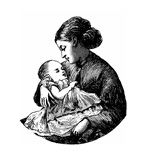
Who Can Judge the Quality of a Life?
GUEST COLUMN
January 22, 2011, marks the thirty-eighth anniversary of Roe v. Wade, one of the most colossal cases of bad judgment ever exercised by the U.S. Supreme Court. Generally, when people think of the women who choose abortion they think of desperate teenagers who are unmarried and frightened beyond compare. Sometimes they think of indigent women who, in their poverty, have no idea how they will feed and clothe another child. Perhaps they think of ambitious career women for whom having a baby would be most inconvenient — a speed bump on the road to success. While these are, indeed, many of the women who believe the fallacy that this brutal procedure will help them get rid of their so-called problem (for they cannot call it a baby), there is another group of women who are increasingly falling victim to the abortion mindset.
Due to advances in medical technology and ever-increasing accuracy in prenatal testing, prospective parents can often be told if their child will be born with a particular medical problem, whether it is a chromosomal issue like Down’s syndrome or a genetic problem like cystic fibrosis.
Rather than being thankful for the advanced knowledge that they will have a child who might encounter some very serious problems from the moment he emerges from the womb, and using that knowledge to make preparations for a potentially difficult delivery, some parents are using it as an opportunity to justify throwing away a precious gift. Many are now seeking recourse to abortion in order to prevent a disabled child from entering the world.
While some parents say that they would rather terminate a disabled baby in order to prevent him from having a life of suffering, in reality they merely wish to prevent suffering for themselves. Let’s not mince words: Sometimes great torment is endured on the part of parents who have medically fragile children. I suffered many times as I held down my infant daughter while nurses jabbed her with needles in search of a vein that would deliver the needed amount of blood for one test or another. I also suffered tremendously the night we almost lost her. As I watched her pallor turn completely gray and she was nearly gone, my soul cried out to God. I endured waves of pain as I wondered how He could let my precious child — His precious child — continue to be subject to the tortures that often accompany her medical care.
You May Also Enjoy
If you don’t want children— contracept. If you don’t want children but you get pregnant— abort. If you do want children but can’t conceive— take fertility drugs.
Research has uncovered a link between soap operas and lower fertility rates in Brazil, Mexico, and Kenya. In fact, some countries have "a history of using soap operas to cut fertility."
Our bodies and our lives are tools at the service of the Kingdom, to be sacrificed if necessary, in imitation of Christ, for a higher good.

